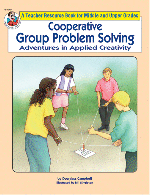Cooperative
Learning/Brainstorming
• Identify Need: Life situations when working in a group outside
your family is necessary
• Introductory Activity: Brainstorm situations or skills
• Define Steps and Sequences of Skill
1. Make eye contact with people in the group.
2. Address the by their names
3. Listen actively.
4. Take turns in speaking.
5. Offer to help others if you can.
6. Exchange ideas with others.
7. Use "tentative" language... "may be... could we consider...
"
8. Respect others' ideas.
9. Be willing to compromise.
10 Willingly follow the group's decision.
• Model the Skill
• Role Plays/Classroom Discussion
• Applications: Classroom projects, library
research work.
• Independent Uses
Rubric for
the Role Plays
Student
(Speaker)____________________________ Student (Subject)____________________________
Date: _____________________ Observer's Name:___________________________________________
Social Skill: ___________________________________
| Observations: | No | Yes |
| Did the student make eye contact with people in the group? | ||
| Did he address people by their names? | ||
| Did he listen actively? | ||
| Did he take turns in speaking? | ||
| Did he offer to help others if he could? | ||
|
Did he exchange ideas with others? |
||
Did
he use "tentative" language... "may be..."
? |
||
| Did he respect others' ideas? | ||
| Was he willing to compromise? | ||
| Was he willingly follow the group's decision? | ||
| Score or Points |
Additional Comments: _______________________________________________________________________
_______________________________________________________________
Teachers: See our
section on Brainstorming ![]()
You may download the form here ![]()
 available
at teachersparadise.com
available
at teachersparadise.com
Code: FS10134
Price: $11.04
Brand: Frank Schaffer Publications
UPC: 17257101343
ISBN: 0867345578
See our Rubric for cooperative
and/or collaborative learning in the classroom ![]()